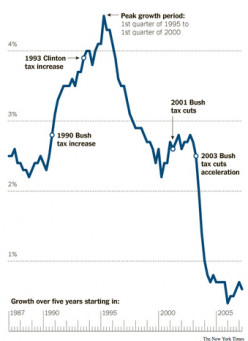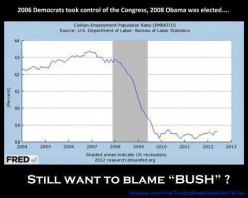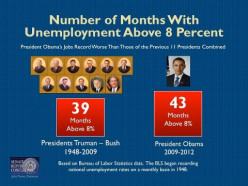Clinging to a belief without evidence. Reducing taxes increases growth

A report from the Congressional Research Service finds there is no correlation in American history between economic growth and the lowering of taxes but that lower taxes on the rich do increase the wealth gap (how surprising). Given the complete lack of evidence for this belief why is it still considered a truism?
http://www.nationaljournal.com/domestic … s-20120917
http://graphics8.nytimes.com/news/busin … conomy.pdf. that is easily understandable, easy Math
20% percent of the US population own 80% of the wealth here.
Now if you increase the tax on the 20% it means the 80% can increase their financial worth.
1 - Lowering personal taxes without lowering corporate taxes is the real problem... you can't encourage growth by eliminating one of the smaller obstacles, and leaving the larger ones.
2 - Charts like this don't really mean anything. They 100% do not account for, anything really. For example, this tries to pin the dot-com bubble bust on Bush's tax cuts, which really doesn't work.
Switch to a territorial tax system, and eliminate corporate taxes, then watch what happens.I recommend you read the report, which is not at all summed up in the graph, it covers most of what you are addressing with the relevant data.
I don't see anything in the index or through search that addresses any of that. Care to point me to a section?
Maybe this will help.
http://www.cbpp.org/cms/index.cfm?fa=view&id=2116Okay I only got so far in your source because of this statement:
"Data from a CBO report released on August 13 indicate that the tax cuts will exacerbate income inequality by boosting the after-tax income of high-income households far more than that of middle- and low-income households."
You'll notice the "far more". Well, no kidding. You do realize that if I make $10 and you make $100 and I cut taxes by 20% across the board, you'll save more than me correct? However, take note that I am still saving money as well. You also realize that this report is dated as well? And not even really speaking of either horse in this race?A quick search, I don't see anything that actually addresses my concerns. Want to point me to a page?
Same as before. I can only lead you to the piece if you haven't the interest to read the whole thing I cannot help you.
Right...
So, I skim over a report, the summary, and search for relevant keywords. You insist that it addresses my concerns, but can't be bothered to substantiate your claim in any form.
I don't read everything on the internet... that would be a huge waste of time. A study like this would be useless if it doesn't adjust for other factors, so I'm not going to bother reading it unless it does.
Two people have claimed that it does, but can't be bothered to quote it, or show where. It's no skin off my back, people make a lot of unsubstantiated claims online.As I said your lack of interest is what makes your statements unfactual and therefore opinion. But you are welcome to your opinion. If your attitude is one of not letting the facts get in the way of a good story I applaud your effort even though it lacks evidence to support your argument. Sorry to bore you.
Ok, let's start over, because you don't seem to understand what I'm getting at.
Does this study in any way adjust for underlying market cycles? Yes or no?
Hi Jaxson.
Your statement suggests that you believe taxes can some how encourage growth. All of the historical data, however, says this is a false notion. The analysis introduced by Josak makes two things perfectly clear: (a) taxes serve only as an instrument for generating revenue for the government or as a mechanism for delivering incentives for some policies; and, (b) they have little or no affect on the economy and the GDP. Tax increases enacted by Presidents Reagan, Bush I, and Clinton were all followed by increased economy activity. In contrast, Jaxson, President G.W. Bush cut taxes twice and the economy did not grow; it declined. Contrary to the claims of a few, the GDP responds mostly to the influences of the global marketplace. We are indeed living in a global economy. In the years following WWII, the manufacturing base in the US was a dynamic force accounting for 40% of our economy. Today, after all the tax cuts in recent decades and the effects of NAFTA, we have seen the economy slow down considerably. We have watched the shrinking gains being channeled to a much smaller and more privileged segment of our society. {1}
Just compare today’s reality to what existed in the last century. Between 1921 and 1971, average incomes in the US grew by $30,533 with 70% of this prosperity going to the bottom 90% of the population and 30% into the pockets of the richest 10%. Since 1971, however, the winds of fortune have shifted dramatically. From then until 2008, average incomes have grown by $12,026 and all of this new wealth accrued to the richest 10% while incomes for the bottom 90% declined. “The remarkable gains of the (broadly-defined) "middle class" in the middle of this [the 20th] century stopped cold in the last quarter of the 1900s.” {2}
I find no causal relationship, Jaxson, between reduction of taxes and GDP growth. Do you?
{1} http://www.nationaljournal.com/domestic … s-20120917
{2} http://www.theatlantic.com/business/arc … rs/262221/
It's like Chinese water torture, that trickle down, trickle down, trickle down mantra.
Here's another interesting misconception about Rs vs Ds and the economy.
And (can't resist) sneaking in another baffling comment by Romney:
"My own view is if we win on Nov. 6, there will be a great deal of optimism about the future of this country," Romney told supporters. "We’ll see capital come back," he continued. "Without actually doing anything, we’ll actually get a boost to the economy."
An analysis in 2008 found that the average annualized return for the Standard & Poor's 500 Index (and its pre-1957 predecessor, the S&P 90)
since 1929 was 0.4% under Republican presidents and 8.9% under Democratic presidents.
President Obama hasn't hurt that trend.
The S&P 500 has risen about 70% since he took office.
Right. But the economy is horrible.Kudos for posting a graphic.
Not sure if it's just my browser, but I can't read it.
I'm hardly alone in still blaming Bush for the economy that crashed when he he was still president:
(CBS News) When President Obama delivers a major campaign speech on the economy today in Ohio, some in his party are concerned it will be too backward looking, with allusions to the presidency of George W. Bush. But according to a new Gallup poll, that message may resonate with voters.
More than three years after Mr. Obama took office, 68 percent of Americans still say former President Bush deserves a great deal or a moderate amount of blame for the struggling economy, according to Gallup. Just 52 percent say the same about Mr. Obama.
And even though economic indicators have kept alive concerns about the pace of the recovery, the poll suggests that independents are more likely to blame Mr. Bush than Mr. Obama -- and even more so now than they were last September.
In September, Gallup found that 60 percent of independents blamed Mr. Obama for the economy. Now, just 51 percent said Mr. Obama deserves blame, while 67 percent said Mr. Bush does.Really, you've hit it on the head there.
People point to someone on the other side to blame.
D's blame Bush, with a D congress, for the crash. Then they blame the R senate, under Obama, for the slow recovery.
R's blame the D congress under Bush, then they blame Obama, with an ornery R senate/congress, for the slow recovery.
The truth is much more complicated, you have to take into consideration all branches to really understand what is going on. The problem is, total control is rare, and short-lived, so trying to find any useful information is almost impossible.
It's never going to change either, I'm afraid.. There will always be someone to blame.
More absurdities. Clinton gets credit for balancing the budget(which he didn't actually balance), with an R congress(the guys in charge of the budget). Clinton also had the dot-com bubble, with skyrocketing revenues, to help.
Then Bush gets the dot-com bubble pop, a major terrorist attack, and the hotly-contested wars to deal with.
All we ever hear is that Clinton was great and Bush sucked.The two wars he created... and of course Bush had the housing Bubble to help his economic growth... which was still terrible. But I agree we should have a no excuses thread, and compare the results of recent policy, conservatives don't complain about the last two years of Democrat control of congress in the Bush presidency, liberals don't blame the conservative congress we have now etc etc.
Well, it's very important to look at every congress as well, instead of just the president.
But, inevitably the story will always be the same. R's introduce a bill meant to do X, which also does Y. D's like X, but hate Y, so they introduce their own bill to do X and Z. R's hate Z. They all vote against each other, and spend all their time saying 'Congressman R voted against jobs' 'Congressman D voted against jobs'.
Probably the single most important thing we could do would be to demand that every bill be just a bill with no piggybacking, no earmarks, no hidden agenda.Okay, you say that. I don't doubt that the wars were Bush's idea. But, the POTUS can't just go to war without anyone else agreeing, too. There are three branches of the government that need to agree on decisions like that. Perhaps its hard to think rationally after you've watched your fellow citizens get slaughtered? I would have gone to war with the scumbags if I were in charge! All I am saying, is at the time, striking back was the general agreement. Now that we have hindsight, perhaps it wasn't the most prudent course of action. But we will never really know, will we?
Not only that , they agreed to Iraq based on the same intel they had gotten from The Clinton's in the previous administration.
Well actually Bush did just go to war and yes he can do that but then he needed congressional approval to continue the war and for further resources which he got, many Democrats were bullied into voting for that, there were cries that it was unpatriotic not to. I can understand Afghanistan though invasion was certainly not the answer, targeted strikes makes more sense, but Iraq was a monstrous mistake.
You may have heard of this recession business, it's been quite the hot topic, the biggest recession since the depression they say, they say it's responsible for the hardship we see, and I am just looking here... ah it started under Bush. Nice try though.
You may have heard of this Congress thing, the body that actually passes legislation, the housing bubble that burst under Bush. The Dems held Congress from 2006-2010 and the housing bubble, that got its start under Clinton. You also might have heard of the Carter years. That debacle that the Democrats created, and Reagan, who turned it around in only one term. No, it wasn't all peaches and cream but all economic indicators were moving upward and people felt the recovery, which is why he won his re-election bid by a landslide. Nice try though.

Sorry but I don't play the excuses game with the blame congress business, a president owns his period and the failures are his or not his Obama owns this period regardless of who is in congress and vice versa.
As for Carter is laughably irrelevant and historic, you may have heard of the fastest period of economic growth on the modern American age... under Clinton and you may have heard that poverty has fallen radically under every Democrat president except for Carter in the modern age and risen or stayed essentially the same in every Republican term see how irrelevant this is?
The topic was the current recession, keep up.
Actually, the topic is concerning taxes and effect on growth. Carter is only irrelevant to the Democrats because 1. it was a mess they created all on their own, and 2. they want to claim no one could have made a difference in one term.
If Obama owns it, then let him own it. You just shifted the blame to Bush. Which is it then? Obama owns it or it's all Bush's fault?Yes taxes vs growth and the professional independent findings are... reducing taxes does not in any way increase growth.
Obama absolutely owns what occurs in his presidency (with how long policies take to kick in taken into account) if Obama had inherited a stable unemployment rate and suddenly raised it then he would be responsible but rather he inherited a skyrocketing unemployment rate and stopped it.
If someone inherits a fast growing economy and then crashes it and if that same person gets a great economy and slows it right down even before the crash then he owns that.
The reason I posted that graph is you always get these things and then you look out the window where people are actually living.........
Nope. Guy on the right said he would solve it by now. Nice try though.
I don't know where there data came from, but if your plot tax revenue vs gdp, lower tax rates result in greater tax revenue to the federal government. It is real simple to plot yourself (so you don't have to rely on someone else playing with the data). All of the data you need can be obtained from the IRS website.
I'm sure you will point out that those who published the reports were COMPLETELY Objective...The CRS is independent yes but I am more than willing to look at info you actually present. I posted my link from an independent source with the full report and the charts to prove it from professional economists. Something similar from you would be great.
Do as I suggested. Go to IRS.government and download tax revenue data and and gdp data, then plot it yourself...then you know that what you see had not been manipulated to fit an idea. Just because an economist wrong an article or drew a graph doesn't keen there is no bias...they have an axe to grind just like anyone else.
Just from what you're saying there is already a problem revenue and GDP has to be calculated by capita and to the exclusion of inflation, if it's not it introduces endless variables that skew the results. That's just for starters.
So what your really saying is that you only want to see a graph of data that's been manipulated. In that case, I can't help you, although I am sure.there are.plenty of liberal think tanks that can provide you with cooked numbers to make your point.
No what I am saying is if you don't account for inflation and capita then the results are invalid, that's why professional economists spend time working over the figures and listing in accurate form what they are doing so you can follow their process.
For example say there is a tax decrease and then inflation goes up 3% that year. Without the tax reduction having any result it looks like revenue just went up 3% but it didn't the same amount of wealth was accumulated see?
This is important stuff if you want accurate results, if you ignore it the results mean nothing at all.
Simple stuff.
That's why I list independent sources which have been independently verified and with the report available so that anyone can read what they did in full.
Don't be insulting just because you were wrong.
Related Discussions
- 126
Obama's 68% Approval Rating
by fishskinfreak2008 16 years ago
So President Obama's approval rating after one month is...only 68%. Our expectations of him on Inauguration night were too high. His approval rating back on Jan. 20 was around 80%.
- 10
Republicans expected to line up behind New START
by rhamson 15 years ago
Yahoo:WASHINGTON – Despite near gridlock in the Senate, Republicans were expected to swing behind a new arms control treaty with Russia that President Barack Obama said they will like, even though some are reserving judgment until Obama can assure them the pact won't set back U.S. defenses against...
- 28
Have You Seen This Photo?
by Raymond D Choiniere 13 years ago
Hey Hubbers,Have you seen the story behind this photo?http://news.yahoo.com/blogs/cutline/sto … 41932.htmlWhat do you think?
- 20
Obama: No ‘radical’ budget fix needed
by bahersadek 14 years ago
Fighting back against Republican calls for greater spending cuts, President Obama said Friday that the government doesn’t need to make major changes to get its budget back on track and called for that solution to include some trims coupled with tax increases.“Here’s the good news: that it turns out...
- 4
When It Comes To The Best-Dressed President, Mr. Obama Seems to Be Ahead of All,
by ngureco 15 years ago
When It Comes To The Best-Dressed President, Mr. Obama Seems to Be Ahead of All, Including JFK?
- 16
THINGS TO THINK ABOUT ..THIS IS ALL TRUE AND OUR PRESIDENTS CLUELESS.
by OLYHOOCH 14 years ago
Barack Obama, during his Cairo speech, said: "I know, too, that Islam has always been a part of America 's story." ...AN AMERICAN CITIZEN'S RESPONSE: Dear Mr. Obama: Were those Muslims that were in America when the Pilgrims first landed? Funny, I thought they were Native American Indians....

















